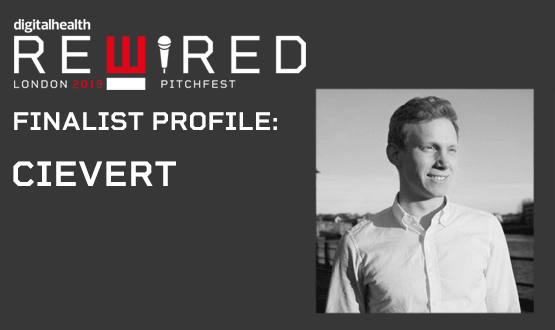After suffering from a rugby injury, Cievert’s chief operating officer (COO), Alex Blakoe, experienced first-hand the challenges of follow-up appointments which promoted him to get involved with the company – which has developed a platform which allows patients to be monitored remotely. The start-up was one of our Rewired Pitchfest 2019 finalists and Digital Health News spoke to them about their experience.
Could you tell us, in your own words, about your innovation and what it does?
Our Penguin platform assesses patients remotely in order to determine if/when they should have a follow-up appointment.
Currently, patients are seen for follow-up at systematic time intervals, rather than receiving clinical support as soon as they need it. They should instead be monitored via Penguin, which constantly assesses them using personalised questions and any other clinical data available (e.g. medical devices or blood tests). If any answers or readings are out of tolerance, Penguin automatically notifies the relevant clinician, who can then follow up with the patient as appropriate.
So, when the patient needs clinical support, they are seen immediately rather having to wait for their pre-determined appointment. Conversely, if the patient is fine, they don’t have to turn up for an unnecessary appointment. This leads to improved clinical outcomes (early intervention) and reduced costs (fewer unnecessary appointments).
What gave you the idea for your product?
I experienced the challenge of follow-up appointments first-hand when I suffered from a rugby injury. After being diagnosed and treated, I was told “see you in eight weeks for your follow-up”. Eight weeks later, I took half a day off work, went to the hospital, got asked two questions, and was sent home.
If my answers had revealed that something was going wrong, then I should have been brought in far earlier. Conversely, given that everything was fine, I could have saved his time, stayed at work, allowing the clinicians to concentrate on a patient who really does need support.
Cievert believes in prioritising the NHS’s incredibly valuable resources for the most patient benefit. Our solution, Penguin, is a way to do just that.
How have you got to where you are now?
Cievert is actually an NHS spin-out. Our success came from implementing Casper – a specialist referral management system – in cancer centres across the UK. This system now manages about a quarter of the UK’s radiotherapy patients.
We’ve since developed other solutions such as an intelligent pathology specimen reporting system and a video call platform for remote consultations. Our latest solution, Penguin, is already being used in the NHS for oncology and gastroenterology patients. It will soon also be used in renal care, cardiology, orthopaedics, urology, and any other clinical discipline where there is routine follow-up.
Why did you decide to enter the health start-up space?
Clinicians have a very hard job. Unfortunately, the digital tools available to them don’t necessarily allow them to do their jobs to the best of their ability. Clinicians want to be treating patients that need to be seen rather than doing admin. Cievert’s aim is to remove inefficiencies and let clinicians do what they do best.
Have you faced any barriers?
IT and information governance teams at hospitals sometimes break out in a cold sweat when they hear what we want to achieve. Fortunately, we have many years of experience securely processing special category patient data, so we easily reassure them off the bat: we have access to NHS servers, we are GDPR compliant, we are ISO:9001 accredited, we are on multiple NHS frameworks. It’s been challenging getting to this point, but we’ve become very good at implementation.
Why did you decide to enter the Digital Health Rewired Pitchfest?
We often come across clinicians who are excited by what we have to offer – the more clinicians we meet, the better! That is why the Rewired Pitchfest was a no-brainer, we got to meet more healthcare professionals and more senior managers than we ever do in one go. In fact, if any clinicians would like to try out Penguin for free and collaborate, we would be delighted to hear from you.
How did you find the experience?
It was an absolutely fantastic day. We met so many interesting people with a similar level of excitement about digital health. We’ve kept in touch with many of them and have met up for more in-depth discussions since.
Looking to the future, what do you hope your product will achieve and what’s the next step in achieving that goal?
Because our software captures such rich data, we reckon there are incredible opportunities to work with the data scientists in order to improve early detection and to personalise treatment. Our colleague, Dr Noura Al Moubayed, and her team at Durham University are starting to do just this. We hope that applying machine-learning to the data will identify trends that will stratify risk and help adapt treatment for each patient’s individual circumstances.
What advice would you give to someone looking to enter the health start-up space?
Healthcare start-ups should work collaboratively with clinicians to develop their solutions. This ensures that the final product is fit for purpose and can be implemented in the existing pathway. Look into IT and information governance constraints early on – it’s a shame when great innovations simply cannot be securely and practically used clinically.
The Digital Health Rewired Pitchfest competition gives innovators from across health and social care the chance to pitch their idea to sector leaders. Want to pitch your start-up or idea to NHS IT leaders and investors? Entries for Rewired Pitchfest 2020 are now open; you can apply here.

